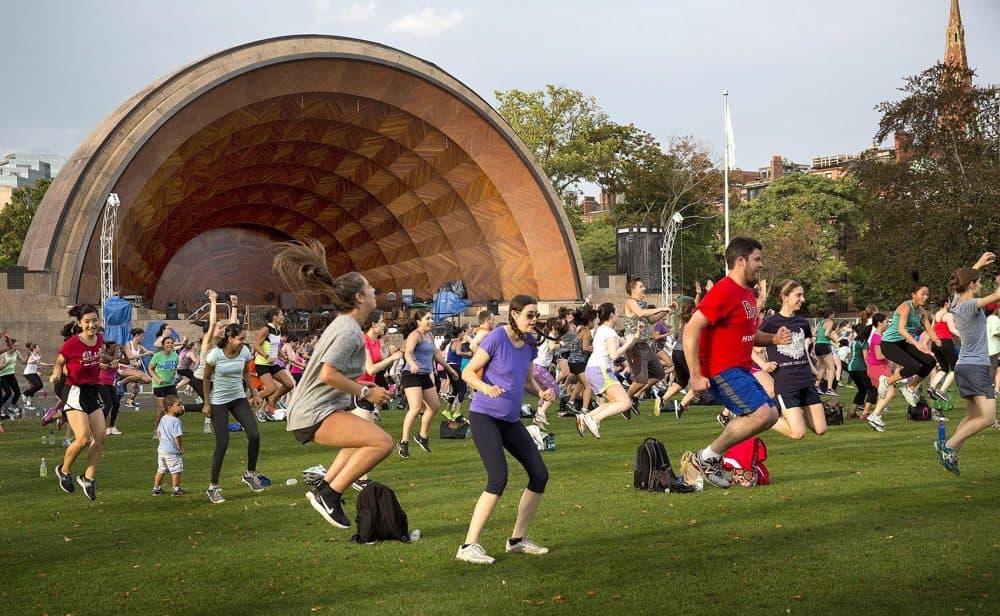Advertisement
Healthy Lifestyle Linked To An Extra Decade Free Of Chronic Disease, Harvard Study Finds

Don't feel bad if you have a less-than-perfect record on these pillars of a healthy lifestyle:
- Not smoking
- Limiting alcohol
- Averaging 30 minutes a day of physical activity
- Maintaining a healthy weight
- Eating healthy
In a new study on their benefits, only 3% of Americans followed from middle age on actually hit five of the five, says Frank Hu, a professor at Harvard T. H. Chan School of Public Health and the paper's senior author. (The research looked at data on more than 70,000 women and nearly 40,000 men, mostly white, who were enrolled in major studies.)
But the benefits add up, he emphasizes, so each healthy behavior brings more of them, even if you fall well short of perfection.
It was already well-known that such healthy behaviors are linked to longer life, but the new study looked at quality of life: To what extent were those added years marred by Type 2 diabetes or cancer or heart disease?
The answer, he says, is a rousing endorsement for healthy living: Women who practiced four or five healthy behaviors enjoyed roughly an extra decade free of disease, and men gained nearly eight years. (I'm typing this while walking on the treadmill now. Honest.)
Here are some highlights from my conversation with Prof. Hu:
What's the take-home message?
The take-home message from this study is that a healthy lifestyle not only improves overall life expectancy but also disease-free life expectancy. We found that people who practice those healthy lifestyle habits lived much longer and also lived more years free of chronic disease compared to those who did not practice any of those lifestyle habits.
In particular, we found that women who practiced all five lifestyle habits gained about 10 years of disease-free life, and men gained about eight years of disease-free life. So this is very important because it means that a healthy lifestyle not only improves lifespan, making people live longer, but also improves health span, which means that people live with much better quality of life.
Is the newest element here that you quantified the gains in "health span"?
In a previous study we found that people who practice healthy lifestyle habits in general lived 10 to 14 years longer than people who did not. In this study, we broke down the overall life expectancies into disease-free life expectancies and life expectancy with chronic disease.
The good news is that most of the years gained through practicing [healthy] lifestyle habits are chronic-disease free, meaning that people gain more years of life free of major chronic disease such as diabetes, cardiovascular disease and cancer.
It's good news, except that very few people seem to do all five of the behaviors. I noticed in the paper there were so few that you had to look at people who scored both four and five.
Unfortunately, not many people in the general public practice all the five lifestyle habits, but the good news is that the benefits of the lifestyle habits are additive — so people who practice three lifestyle habits did much better than people who practice none. And people who were able to maintain four or five had substantial gain in terms of being chronic-disease-free life expectancy.
So it’s really important to practice as many healthy lifestyle habits as possible but certainly even for people who are overweight or obese, if they're eating a healthy diet and being physically active, they can still have substantial health benefits in terms of reducing risk of chronic disease.
How small was the group who do all five healthy practices?
In our cohorts — we followed about 80,000 women and 40,000 men for almost three decades — we found less than 3% practiced all five healthy lifestyle habits. So this is a small proportion of the participants, but even those who practice three did much better than those who practice none or only one.
The bottom line is: the more, the better.
Is this study the biggest of its kind or some other superlative?
This is one of the first studies to quantify disease-free life expectancies associated with those lifestyle habits, and this kind of message is much more concrete, more encouraging, more positive than just saying that eating a healthy diet and being physically active will be good for you. Here, we provide precise information on how many years of life you can add, and how many of those years are good years of life in terms of being free from major chronic disease.
It looks like drinking alcohol had the weakest effect among the five behaviors, right?
Alcohol is a tricky lifestyle factor. The overall message is not to drink too much alcohol, and, for a middle-aged man or woman, if they choose to drink alcohol, it should be in moderation: For women, no more than one drink per day, and for men, no more than two drinks per day.
You didn't look at effects on Alzheimer's disease or other dementias?
Lifestyle factors also have significant benefits on prevention of other aging-related disease, such as Alzheimer's disease, dementia and respiratory disease. It’s just that the evidence on the relationship between lifestyle factors and dementia and other age-related diseases is not as strong compared to the literature on Type 2 diabetes, cardiovascular disease and cancer.
So that’s why we were focused on those three major chronic diseases. And this means that the benefits we observed in this study are likely to be an underestimate because we didn’t take account of other effects.
What's next?
In this study, we’ve been focused on participants in our large cohort studies, who are mostly white. We want to see whether the same findings can be extended to other populations, such as in different ethnic and racial groups.
